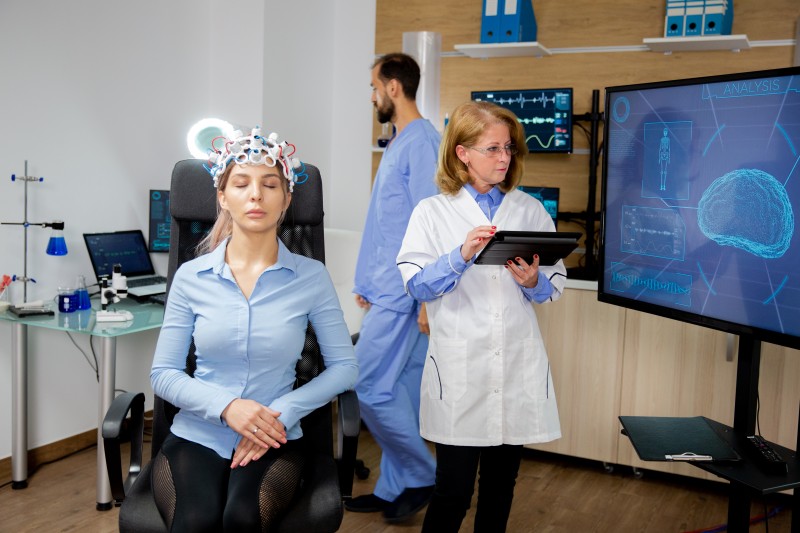When it comes to the delicate and complex conditions of the brain and spine, choosing the right medical team is paramount. At Specialty Care Clinics, we have established a center of excellence for neurosurgery, dedicated to providing unparalleled care with a focus on precision, compassion, and patient-centric treatment. Our team of highly skilled neurosurgeons, neurologists, and support staff work together to manage the most intricate neurological disorders, from common issues to the most complex cases.

A Multidisciplinary Approach to Brain and Spine Health
Our approach to neurosurgery is not just about surgical procedures; it’s about providing holistic care that considers every aspect of your health and well-being. We utilize a multidisciplinary model, where our neurosurgeons collaborate closely with other specialists, including oncologists, physical therapists, and pain management experts. This ensures that every patient receives a comprehensive and tailored treatment plan, encompassing diagnosis, surgery, and a robust rehabilitation program for a smoother recovery.
We specialize in a wide range of neurosurgical services, including but not limited to:
- Brain Tumor Surgery: Our experts use advanced techniques like neuro-navigation and intraoperative monitoring to precisely remove brain tumors while preserving vital neurological function. We handle both benign and malignant tumors with the highest level of care.
- Spine Surgery: From degenerative disc diseases and herniated discs to spinal deformities and tumors, we offer a full spectrum of spine surgeries. Our focus on minimally invasive techniques leads to less pain, smaller incisions, and faster recovery times for our patients.
- Vascular Neurosurgery: We treat complex cerebrovascular conditions such as aneurysms, arteriovenous malformations (AVMs), and strokes, employing both open surgical and endovascular techniques to restore blood flow and prevent complications.
- Functional Neurosurgery: This specialized field focuses on treating chronic neurological disorders like Parkinson’s disease, essential tremor, and epilepsy. Procedures like Deep Brain Stimulation (DBS) can significantly improve quality of life for patients who have not responded to medication.
- Pediatric Neurosurgery: Our compassionate team provides specialized care for children with neurological conditions, including congenital anomalies, hydrocephalus, and pediatric brain tumors.
Cutting-Edge Technology for Unmatched Precision
Precision is the cornerstone of neurosurgery. To achieve the best possible outcomes, we have equipped our facilities with the latest state-of-the-art technology. This includes:
- Advanced Imaging: High-resolution MRI and CT scans for accurate diagnosis and surgical planning.
- Neuro-navigation Systems: GPS-like technology that provides our surgeons with a real-time, 3D map of the brain or spine, allowing for exceptional accuracy during surgery.
- Intraoperative Monitoring: Real-time monitoring of nerve function during surgery to minimize the risk of damage.
This investment in technology empowers our surgeons to perform intricate procedures with unparalleled precision, enhancing patient safety and improving long-term results.
Conclusion
At Specialty Care Clinics, our commitment to neurosurgery goes beyond technical expertise. We are dedicated to providing compassionate, patient-centered care, ensuring that every individual feels supported and informed throughout their medical journey. Our combination of a world-class team, a multidisciplinary approach, and advanced technology makes us a leading choice for neurosurgical care. We believe that by treating each patient with empathy and respect, we can not only heal their conditions but also restore their hope and quality of life.
Related FAQs
1. What is the difference between a neurologist and a neurosurgeon?
A neurologist is a medical doctor who diagnoses and treats disorders of the nervous system without surgery. A neurosurgeon is a physician who specializes in the surgical treatment of brain, spinal cord, and nervous system disorders. They often work together to provide comprehensive care.
2. Are all neurosurgeries performed in a hospital?
Yes, neurosurgical procedures, whether they are major or minimally invasive, require a sterile and fully-equipped hospital operating room with a team of specialized staff, including neurosurgeons, anesthesiologists, and nurses.
3. How long is the recovery time for neurosurgery?
Recovery time varies widely depending on the type of surgery, the patient’s overall health, and the condition being treated. While minimally invasive procedures may have a shorter recovery, more complex surgeries can require several weeks to months of rehabilitation. Your care team will provide a detailed recovery plan.
4. Is neurosurgery a high-risk procedure?
Like any surgical procedure, neurosurgery carries risks. However, with the advancements in medical technology, imaging, and surgical techniques, the risks have been significantly reduced. Our team will discuss all potential risks and benefits with you prior to the procedure.
5. Do I need a referral from my primary care doctor to see a neurosurgeon?
In most cases, yes. A primary care physician or neurologist typically refers a patient to a neurosurgeon after initial diagnostic tests and non-surgical treatments have been explored. This ensures that you are seeing the most appropriate specialist for your condition.
Ready to take the next step toward better health? We invite you to explore our website https://sccplano.com/locations/east-plano/ to learn more about our services and our expert team. For a detailed consultation or to book an appointment, please don’t hesitate to call us (972) 848-0873 / (972) 633-8747. Our friendly staff is ready to answer your questions and guide you on your journey to recovery.
